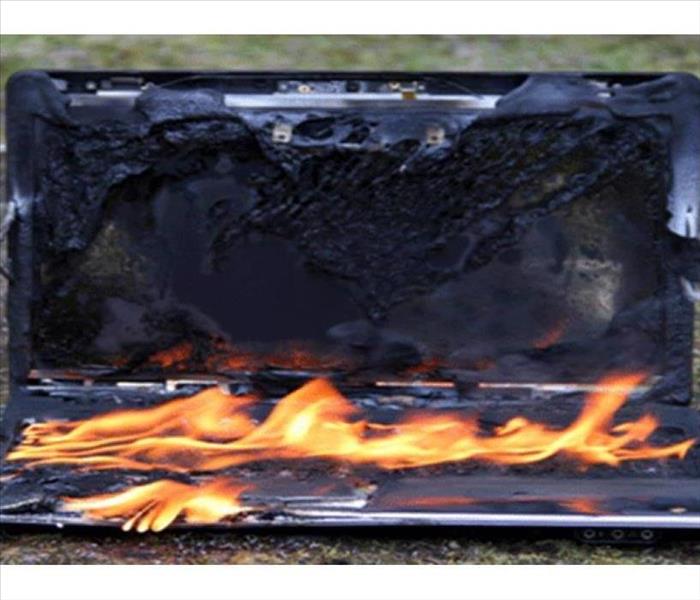Fire Hazards: Batteries, Microwaves, Laptops and Clutter
1/19/2021 (Permalink)
Most people are aware of the common causes of house fires – including fireplaces, old electrical wires and candle. At SERVPRO of Newtown and Southern Litchfield County, we have restored homes in which the fire was caused by other, less common but still equally as destructive, sources.
- Battery Fires: You’d be surprised at how widespread a fire from household batteries can be. When the terminals touch each other, or a metal source such as a key, a fire can start. Batteries should be stored in a battery storage case, if one is available. If you do not have one, store them standing up, rather than loose in a container or drawer. Shorts can be prevented by placing electrical tape over the ends when they are being stored as well as when disposing. 9 volt batteries are particularly risky due to the proximity of their terminals. Never throw batteries into your garbage can or even in a bag together as that could start a fire.
- Microwave Fires: Microwaves can catch fire for a number of reasons- from unnoticed metals on dinnerware or take out containers to overcooking food such as burnt popcorn. Microwaves can also malfunction and catch fire. If something in your microwave has caught fire, unplug it if it is safe to do. Do not open the microwave door, as this will fuel the fire with oxygen. With no air, the fire should suffocate itself.
- Dryer Lint: Make sure that everybody in your family knows to clean the dryer lint out of your dryer with every load. Because the lint trap only catches 25% of the lint, the exhaust and duct work should also be cleaned periodically.
- Light bulbs: The main cause of lightbulb fires is when a light bulb with too high of wattage for a given outlet is used. Be sure to check the label on your lamp and when in doubt, keep it under 60 watts. Caution must also be taken when using CFLs (compact fluorescents). The spiral shaped CFL’s should not be used in an enclosed fixture. If your CFLs are burning out early and you notice they are brown at the base when you remove them, the bulbs are overheating and could result in fire. The newer LED lights are cooler and less prone to causes a fire and also have a much nicer glow to them.
- Laptops: We’ve all felt the heat of a laptop on our lap after its been used for a while. You may have even seen some photos of a laptop that burned somebody’s bedding.
Laptops can get pretty hot during normal operation. Never leave your laptop on a bed or couch, or any place where its cooling vents are blocked. This could result in fire. Store laptops securely on a desk or laptop stand. - Clutter: Stacks of newspapers or magazines can ignite quickly if left too close to a heat source. If you must keep old newspapers or magazines, be certain to store them in a cool, dry place in short stacks. The same goes for any clutter – whether that be a pile of sweaters stacked in your closet next to a light bulb or stuffed animals that touch a nightlight.
- Old appliances: The wiring on older appliances often becomes worn and begin to disintegrate. Check them regularly to ensure good working condition and the safety of cords and connections. Even if your unit is working properly, consider replacing it if the electrical wiring is not up to code.
These tips take little time and effort to follow and can save you from a house fire.





 24/7 Emergency Service
24/7 Emergency Service
